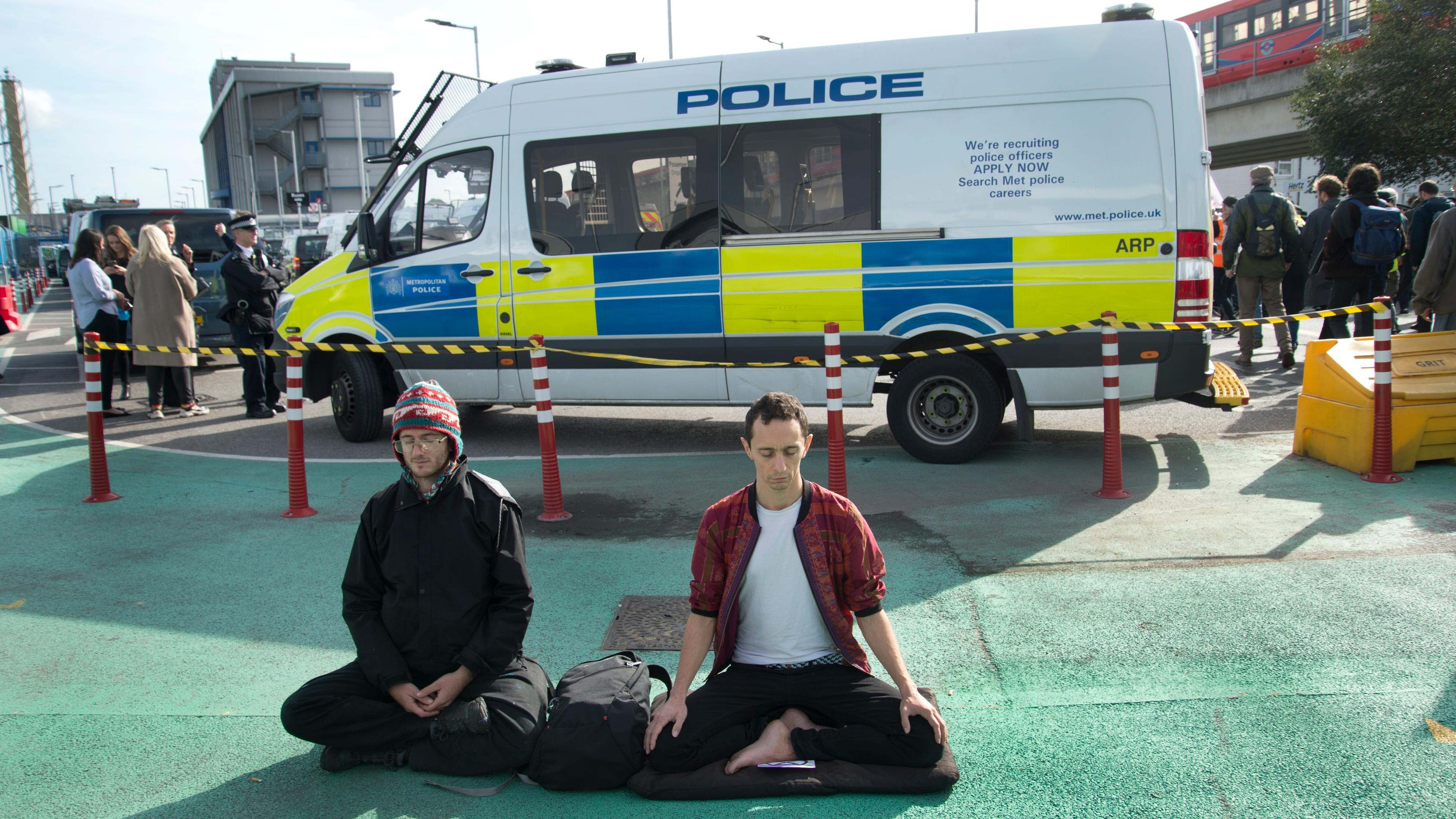People start meditating for a variety of reasons: to increase their wellbeing, reduce their stress, enhance their performance. It’s rarer that they start with a moral intent in mind. But, throughout the millennia, contemplative traditions such as Buddhism and Hinduism have advised that meditation and moral development go hand in hand.
Traditionally, someone who meditates is said to become more sensitive to the suffering that harmful thoughts or actions produce. The idea is that the more one reduces this internal and external agitation, the easier it becomes to calm the mind through meditation. So, the basic assumption is that the more you meditate, the more moral you become, and the more moral you become, the better your meditation gets. Many prominent figures in the meditation community hold the belief that, if more people meditated, the world would become a better place.
But many people have also heard horror stories about spiritual gurus and meditation masters who broke bad. And some of us will know a person who meditates a lot but who isn’t a moral paragon. It seems too hasty to say that meditation will predictably make someone more moral. Yet, to many people in contemplative traditions, and now in the general population, this intuition holds strong.
Consider two real-life examples. One man, whom we’ll call Ning, was addicted to heroin and had abandoned his child when he showed up at the monastery where one of the authors (Kevin) lived as a Buddhist monk. After arriving, Ning started meditating and turned his life around. Today, he is a model father to his child and has a steady life. For another man who arrived at the same monastery earnestly seeking a meditative life – we’ll call him Tim – the experience turned out very differently. As the years progressed, Tim started to lie and to emotionally manipulate others, and the longer he stayed, the more intimidating and aggressive he became. Eventually, and unfortunately, he left.
Is it enough to say that one of these people got morally ‘better’, or that the other got ‘worse’, because they took up a lifestyle devoted to meditation? Surely it is more complex than that. Casting meditation as either a moral panacea or as morally ineffectual (or worse) is likely to produce an unfair picture. Yet with so many people now practising meditation – perhaps you are one of them, or you’ve considered giving it a try – it is useful to ask what, exactly, these practices tend to do to people’s moral lives.
The moral world is complex, so a careful and nuanced investigation of how meditation might affect a person morally is the best way forward. While anecdotes, beliefs or long-held traditional wisdom can be informative, empirical findings offer greater assurance. So, we recently undertook a review of the empirical literature on this subject. The picture that emerges from our analysis runs counter to the intuitions of many in the contemplative traditions, and even of many scientists. In short, the varied styles of meditation might do different things to different dimensions of a person’s morality, for better or worse.
Scientific research in this area understandably tends to look at how meditation affects singular factors in moral functioning, such as specific behaviours like donating money to charity, or self-reported experiences of compassion. But the contemplative traditions from which meditation practices sprang do not view moral development in such a singular or myopic manner. Instead, they consider a variety of moral factors, and whether they function in alignment. For example, in Buddhist traditions, a seemingly good deed (such as a charitable donation), when done in the absence of a good intention, is just a deed, and it can even be a bad deed if the intention is bad.
Investigations of meditation’s moral import should take into account the varied kinds of moral functioning these practices aim to develop. This can be done by examining multiple factors in moral psychology, both on their own and as a unified whole. Without approaching the question of what meditation does to our moral lives from a multi-factor perspective, we run the risk of misrepresenting the moral efficacy of the practices or missing their potential downsides.
Looking at these ‘parts’ individually, we can build a picture of how meditation affects the moral ‘whole’
The field of moral psychology has in fact long identified, and can empirically measure, many factors or ‘parts’ that are involved in moral functioning – such as moral identity, awareness, intuitions, judgments, decisions and reasoning, motivations, emotions, behaviours and responsibility. Your moral identity, for example, can include things like whether you view yourself as ‘honest’, ‘fair’ or ‘kind’. Your moral emotions include anger, disgust, compassion, gratitude, guilt and shame, which might in turn drive your moral intentions, such as whether you intend to help someone in distress. Looking at each of these ‘parts’ individually, and then gathering them together, we can start to build a useful empirical picture of how people function as complete moral beings, and how practices such as meditation affect that moral ‘whole’.
This approach could also help to determine what kinds of meditation might be of best use in different populations, such as people in schools, businesses, government or prisons. For example, if the evidence shows that a certain kind of meditation tends to reduce aggression, it might be especially useful for a prison population. But if that same meditation practice seems to blunt those prisoners’ feelings of emotions like guilt, that might call for substituting or adding other practices. Similarly, a particular form of meditation might tend to make a government official’s moral judgments more fair, but have no effects, or negative effects, in other areas, such as their moral emotions.
So, what can we say so far about how different forms of meditation seem to affect different aspects of morality? Let’s first consider secular mindfulness meditation, which originally stems from Buddhism but was adapted to make it more accessible as a means of clinical stress reduction. The objective with secular mindfulness is to follow one’s breath, and observe thoughts and feelings come and go. Most studies in this field typically rely on people who have undertaken approximately eight weeks of practice.
Studies suggest that this form of meditation can have a positive influence on factors such as moral reasoning, judgments, decisions, and some behaviours. This includes, for instance, cooperating with others who aren’t cooperating; deciding to not punish someone; judging harsh critics less severely; offering assistance to someone in pain; or reduced aggression toward a provocateur. One such study found that non-meditators made progressively more selfish decisions that involved inflicting harm on others for a payoff; those who meditated showed a reduced tendency to slide down this ‘slippery slope’. In another study, when given the option to cooperate with an unfair partner in an experimental game, meditators tended to be more cooperative than non-meditators. (In doing so, they actually ended up with more monetary gains by the end).
Meditation may have positive effects on a person’s morality while also producing some negative side-effects
At the same time, secular mindfulness meditation appears to have less of a positive influence on people’s moral identity or moral emotions. For example, researchers found that anger towards a provocateur remained, despite the reduced aggression. Research suggests that mindfulness can even negatively influence meditators’ moral feelings and intentions in some cases, where one might exhibit less guilt after harming a friend, or become less willing to show support to a remorseful prison inmate.
Research on kindness or compassion meditation has also found mixed effects. This form of meditation is again largely drawn from Buddhism but, in this case, meditators actively attempt to develop intentional thoughts of kindness or compassion toward others and themselves. It appears to have a positive influence on moral emotions: for example, those who practised four weeks of compassion meditation reported greater feelings of compassion towards people with low socioeconomic status. Yet it seems to have either limited or sometimes no influence over actual moral behaviours (eg, no increase in donations or writing letters of support).
Zooming out, what the empirical research shows is that meditation – in its different forms – may have some positive effects on a person’s morality while also potentially producing some negative side-effects. But there is no data on how experienced meditators with many years of practice act in moral situations, so it remains unclear what the long-term effects of these practices could be.
We can still make some inferences about how meditation’s moral influence might play out in everyday life. For instance, you can imagine that if you are given mindfulness mediation training to be ‘non-judgmental’ and ‘non-reactive’ towards the various thoughts or feelings you have, it could help you avoid snapping angrily at your friend if they are annoying you. At the same time, being non-reactive to your own feelings of guilt after you’ve lied to that friend might be a less helpful byproduct.
While the moral effects of meditation require further scientific investigation, current or potential meditators can nevertheless start to look into their own personal lives and consider how a particular style of meditation might affect them for better or worse. And there is further reason to believe that meditation can help a person grow morally in at least some ways.
Meditation can help a person realise how difficult the process of moral self-regulation is to control. When you meditate, you start noticing your own negative impulses and habits in a more refined manner. For example, you might recognise that little sarcastic comments that get a laugh from friends can actually be pretty toxic or degrading; or that you sometimes automatically slip into ‘fudging’ the truth in order to agree with someone. In achieving this increased self-awareness, you may become more forgiving when others fail. You can view people – including yourself – as having different moral ‘parts’ that need to be tuned up, as opposed to assuming the whole machine is broken beyond repair.
Meditation can also enable you to take a hard look at how morality affects your wellbeing. When one of us, Kevin, started meditating, he was doing it to realise a higher truth and find deep, contented peace. Initially, he didn’t buy into the idea that the more you meditate, the more moral you become. But the more he contemplated his thoughts, speech and actions through meditation, the more he realised that things like vindictiveness and selfishness were causing him to suffer. He found that immoral thoughts produced subtle agitation in his mind, and that’s the last thing you want when you are aiming for calm. He also noticed that if his moral intentions weren’t aligned with his acts, or if he didn’t take responsibility for his ethical shortcomings, this disturbed his meditation when he sat down later.
As his mindfulness grew with continued meditation practice, he started to notice that, if his speech and actions were morally off, they had a subtle negative impact on others and the world around him, even when he ‘got away’ with it – and that reverberated back to him. For example, he noticed that, if he tweaked his stories to make them a little funnier (if less truthful), others laughed along, but they seemed to trust him a little less the next time they talked to him. Meditation helped him realise how much his own wellbeing was intricately tied into others’ wellbeing, and that was dependent on how he morally engaged with the world.
Making meditation a part of your life entails using it to look at every part of your life. So, checking in on how you are treating others can become an ongoing process that might involve facing some uncomfortable truths about yourself. The science on meditation and morality remains complex, suggesting the potential for both moral improvement in some ways and hindrance in others. But awareness and acceptance of this complexity could help you make better decisions about how you meditate, and what kinds of meditation are best for your moral engagement with the world. You might find that meditation is one of the most useful moral tools at your disposal; using it well requires having an open mind about what it can and cannot do.
This Idea was made possible through the support of a grant to Aeon+Psyche from the John Templeton Foundation. The opinions expressed in this publication are those of the author and do not necessarily reflect the views of the Foundation. Funders to Aeon+Psyche are not involved in editorial decision-making.
This Idea is part of a series on contemplation produced with the Monash Centre for Consciousness and Contemplative Studies.








